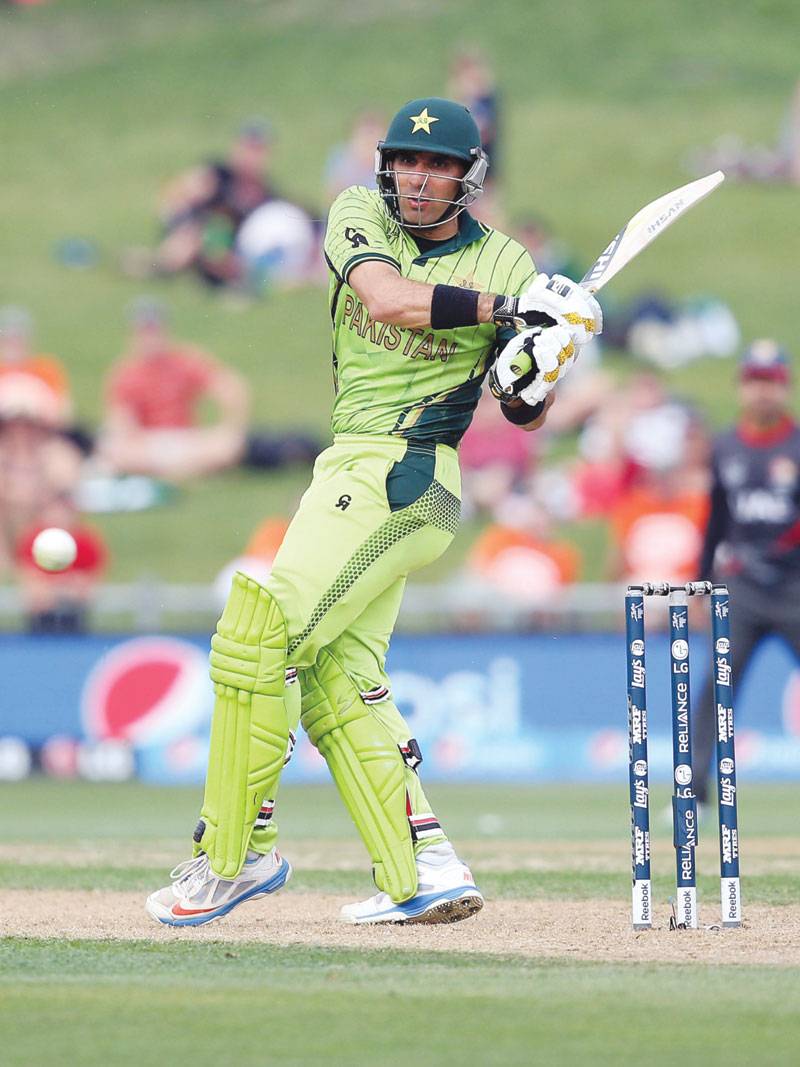AUCKLAND - What's the toughest job in sport? Managing the Brazil or England football team or coaching England's cricket squad, for that matter? For Pakistan's Misbah-ul-Haq, the answer is simple -- it's his position as captain of a team already dubbed "predictably unpredictable" by a rival coach at the World Cup.
As well as two heavy defeats in their opening games in Australia and New Zealand, eight Pakistan players were fined for breaking a curfew, there were claims of a training ground bust-up while chief selector Moin Khan was sent home for visiting a Christchurch casino. Then there are the team's millions of demanding fans back home.
Frustrated by the absence of international cricket in the country because of the 2009 attack on the touring Sri Lanka team, and then embarrassed by the jailing in England of three players for corruption in 2011, the captain is the punchbag of the Pakistan team. But in his five years in charge, 40-year-old Misbah has become Pakistan's most successful Test captain.
In one-day internationals, he has overseen victories over arch-rivals India -- in India -- and South Africa on their home turf. But if he scores runs and the team fails, he is the go-to target. If he doesn't score and the team does well he is still the target. When Pakistan lost their opening games at the World Cup to India and West Indies, effigies of Misbah were burned in Lahore while, in the south-eastern city of Multan, a mock funeral was held for the team.
"It's one of the top five toughest jobs in the sporting world," Misbah told AFP. "There are lots of expectations and when they are not fulfilled you get criticised, at times unnecessarily. Every other day you suffer and it has a negative effect on the team as players get hurt, their families are affected and the team's focus is distracted."
Captaining the Pakistan cricket team has always appeared to be mission impossible. When Javed Miandad was appointed captain in 1980 he faced a revolt from senior players who complained they had been over-looked. The same fate befell Wasim Akram in 1994. Even Imran Khan, born in the same Punjab city of Mianwali as Misbah, was forced to leave after leading Pakistan to their one and only World Cup title in 1992.
In 1998, Aamer Sohail didn't even turn up on the morning of a Test after differences with the Pakistan Cricket Board (PCB). Saeed Anwar was replaced as captain mid-way through a series two years later. The pre-World Cup period was the toughest for Misbah, as his form slumped so badly that he withdrew from the third one-day international against Australia last October.
Despite the PCB's support -- announcing him captain until the World Cup -- there were doubts over whether or not Misbah would lead Pakistan at the tournament. "That was the toughest period of all," recalled Misbah. "I wasn't scoring runs and then I got injured." Misbah's position was threatened by the more popular Shahid Afridi, who he had replaced as one-day captain in 2011, a year after his appointment as Test skipper in the post spot-fixing saga. That calamitous episode, on Pakistan's tour of England in 2010, saw Test captain Salman Butt and pace bowlers Mohammad Asif and Mohammad Aamer banned for five years. All were jailed. "I have always tried to avoid conflicts. After the spot-fixing fiasco, we needed stability and to avoid controversies. Obviously every player has his own mindset and a captain needs to be flexible to deal with that," Misbah told AFP. "We needed solutions rather than leaving things unresolved and making them more complicated. My cool nature helped me otherwise it was tough to survive just for two days." Apart from Misbah's captaincy style, his slow batting in one-dayers once earned him the mocking nickname of "tuk-tuk" -- (the Urdu phrase for the sound made when the ball comes off the bat when a defensive stroke is played). "I needed to stay at the wicket so I didn't play to my strengths. Whenever I went in to bat the team was under pressure," said Misbah. The perception of Misbah as a pragmatic batsman was shattered with his 56-ball hundred in a Test against Australia in October -- equalling the record for the fastest hundred.
Saturday, April 20, 2024
Punchbag Misbah rises above Pakistan trouble and strife

DC for timely preparations for heavy rains
April 20, 2024
Sargodha commissioner orders shifting cattle out of city
April 20, 2024
Oil jumps, equities fall as Iran blasts fan Mid East fears
April 20, 2024
A Tense Neighbourhood
April 19, 2024
Dubai Underwater
April 19, 2024
X Debate Continues
April 19, 2024
Hepatitis Challenge
April 18, 2024
IMF Predictions
April 18, 2024
Kite tragedy
April 19, 2024
Discipline dilemma
April 19, 2024
Urgent plea
April 19, 2024
Justice denied
April 18, 2024
AI dilemmas unveiled
April 18, 2024
ePaper - Nawaiwaqt
Advertisement
Nawaiwaqt Group | Copyright © 2024





